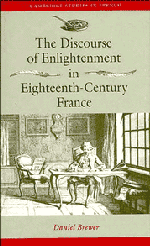Book contents
- Frontmatter
- Contents
- List of illustrations
- Acknowledgments
- Introduction
- 1 Representing knowledge: reading the Encyclopédie
- 2 Enlightenment critique and Diderot's art of philosophizing
- 3 The matter of judgment and the art of phrasing sensation
- 4 Critical narratives: Diderot's Salons
- 5 Embodying knowledge
- 6 Portraying Diderot: the aftermath
- 7 Interpreting Diderot: critical values, critical violence
- Notes
- Index
- Cambridge Studies in French
6 - Portraying Diderot: the aftermath
Published online by Cambridge University Press: 23 November 2009
- Frontmatter
- Contents
- List of illustrations
- Acknowledgments
- Introduction
- 1 Representing knowledge: reading the Encyclopédie
- 2 Enlightenment critique and Diderot's art of philosophizing
- 3 The matter of judgment and the art of phrasing sensation
- 4 Critical narratives: Diderot's Salons
- 5 Embodying knowledge
- 6 Portraying Diderot: the aftermath
- 7 Interpreting Diderot: critical values, critical violence
- Notes
- Index
- Cambridge Studies in French
Summary
Quand je parle de la voix publique … je parle de ce petit troupeau, de cette église invisible qui écoute, qui regarde, qui médite, qui parle bas et dont la voix prédomine à la longue et forme l'opinion générale; je parle de ce jugement sain, tranquille et réfléchi d'une nation entiére, jugement qui n'est jamais faux … [et] qui assigne à toute production sa juste valeur.
Diderot, Le Pour et le contre.Arguably, the history of Diderot's reception amounts to a series of misreadings that stem in large measure from an unavoidable ignorance of many of his major and now familiar texts. Far more complicated than most, the publishing history of this æuvre is one of constant additions, discoveries, and revisions, as it moved slowly and circuitously from one state of completion to another between 1798, when Naigeon published his edition of the æuvres complètes, and 1970, when the first volumes of the Hermann edition appeared. Naigeon's “complete” portrayal was highly partial, an inevitable misapprehension that was not to end soon. The next major edition was published by Brière (1821–23), followed by the Paulin edition of 1830. Only in 1875 would Assézat and Tourneux present the most complete portrayal of Diderot in what for a century would remain the standard edition. Yet even Assézat-Tourneux now appears incomplete, given Herbert Dieckmann's discovery of the Vandeul manuscripts in 1951, the publication of the Commentaire sur Hemsterhuis in 1964, and the ongoing appraisal of Diderot's contribution to Grimm's Correspondance littéraire and to Raynal's Histoire des deux Indes.
- Type
- Chapter
- Information
- The Discourse of Enlightenment in Eighteenth-Century FranceDiderot and the Art of Philosophizing, pp. 204 - 251Publisher: Cambridge University PressPrint publication year: 1993

